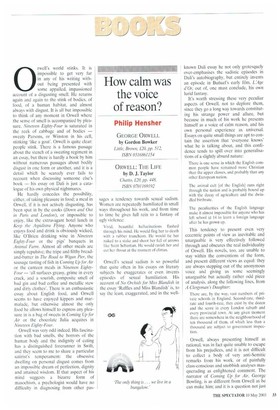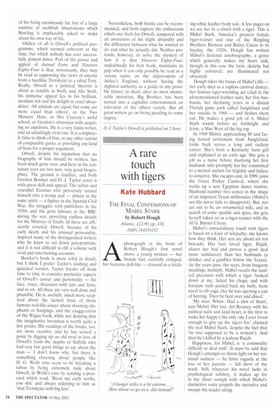How calm was the voice of reason?
Philip Hensher
GEORGE ORWELL by Gordon Bowker Little, Brown, £20, pp. 512, ISBN 0316861154 ORWELL: THE LIFE by D. J. Taylor Chatto, 120, pp. 448, ISBN 0701169192 Qrwell's world stinks. It is impossible to get very far in any of his writing without being presented with some appalled, impassioned account oi a disgusting smell. He returns again and again to the stink of bodies, of food, of a human habitat, and almost always with disgust. It is all but impossible to think of any moment in Orwell where the sense of smell is accompanied by pleasure. Nineteen Eighty-Four is saturated in the reek of cabbage and of bodies — sweaty Parsons, or Winston in his cell, stinking 'like a goat'. Orwell is quite clear: people stink. There is a famous passage about the stench of a sweating regiment in an essay, but there is hardly a book by him without numerous passages about bodily disgust in one form or another, and it is a detail which he scarcely ever fails to recount when discussing someone else's book — his essay on Dali is just a catalogue of his own physical nightmares.
He hardly concedes the possibility, either, of taking pleasure in food; a meal in Orwell, if it is not actively disgusting, has been spat in by the cooks (Down and Out in Paris and London), or impossible to enjoy, like the extravagant hotel lunch in Keep the Aspidistra Flying. Anyone who enjoys food and drink is obviously wicked, like O'Brien drinking wine in Nineteen Eighty-Four or the pigs' banquets in Animal Farm. Almost all other meals arc simply repulsive; the tripe and filthy breadand-butter in The Road to Wigan Pier, the sausage tasting of fish in Coming Up for Air or the canteen meals in Nineteen EightyFour — 'ail surfaces greasy, grime in every crack, and a sourish, composite smell of had gin and bad coffee and metallic stew and dirty clothes'. There is an enthusiastic essay about English food, and Orwell seems to have enjoyed kippers and marmalade, but otherwise almost the only food he allows himself to express any pleasure in is a bag of sweets in Coming Up for Air or the chocolate Julia acquires in Nineteen Eighty-Four.
Orwell was very odd indeed..His fascination with bad smells, the horrors of the human body and the indignity of eating has a distinguished forerunner in Swift, and they seem to me to share a particular satirist's temperament: the obsessive dwelling on personal disgust comes from an impossible dream of perfection, dignity and attained wisdom. If that aspect of his mind suggests a bizarre form of masochism, a psychologist would have no difficulty in diagnosing from other pas sages a tendency towards sexual sadism. Women are repeatedly humiliated in small ways throughout his work, and from time to time he gives full rein to a fantasy of ugly violence:
Vivid, beautiful hallucinations flashed through his mind. He would flog her to death with a rubber truncheon. He would tie her naked to a stake and shoot her full of arrows like Saint Sebastian. He would ravish her and cut her throat at the moment of climax.
Orwell's sexual sadism is so powerful that quite often in his essays on literary subjects he exaggerates or even invents episodes of sexual humiliation. His account of No Orchids for Miss Blandish in the essay 'Raffles and Miss Blandish' is, to say the least, exaggerated, and in the well known Dali essay he not only grotesquely over-emphasises the sadistic episodes in Dali's autobiography, but entirely invents an episode in Bunuel's early film, L'Age d'Or, out of, one must conclude, his own lurid fantasy.
It's worth stressing these very peculiar aspects of Orwell, not to deplore them, since they go a long way towards constituting his strange power and allure, but because in much of his work he presents himself as a voice of calm reason, and his own personal experience as universal. Essays on quite small things are apt to contain the assertion that 'everyone knows' what he is talking about, and this confidence tends to spill over into generalisations of a slightly absurd nature:
There is one sense in which the English common people have remained more Christian than the upper classes, and probably than any other European nation.
The animal cult (of the English] runs right through the nation and is probably bound up with the decay of agriculture and the dwindled birthrate.
The peculiarities of the English language make it almost impossible for anyone who has left school at 14 to learn a foreign language after he has grown up.
This tendency to present even very eccentric points of view as inevitable and unarguable is very effectively followed through and obscures the real individuality of Orwell. His novels, too, are unable to stay within the conventions of the form, and present different views as equal: they are always stepping out of the anonymous voice and giving us some seemingly unarguable but actually rather odd piece of analysis, along the following lines, from A Clergyman's Daughter:
There are, by the way, vast numbers of private schools in England. Second-rate, thirdrate and fourth-rate, they exist by the dozen and the score in every London suburb and every provincial town. At any given moment there are somewhere in the neighbourhood of ten thousand of them, of which less than a thousand arc subject to government inspection.
Orwell, always presenting himself as rational, was in fact quite unable to escape from his prejudices, and it is not difficult to collect a body of very anti-Semitic remarks from his work, or of painfully class-conscious and snobbish analyses masquerading as enlightened comment. The narrator of Coming Up for Air, George Bowling, is as different from Orwell as he can make him; and it is a question not just of his being enormously fat, but of a large number of snobbish observations which Bowling is implausibly asked to make about his own way of life.
Oddest of all is Orwell's political programme, which seemed coherent at the time, but which nobody has ever successfully pinned down. Part of the power and appeal of Animal Farm and Nineteen Eighty-Four is that, notoriously, they may be read as supporting the views of anyone from a hardline Trotskyite to a rabid Tory. Really. Orwell as a political theorist is about as tenable as Swift, and, like Swift, his immense appeal lies in his brilliant, mordant wit and his delight in cruel absurdities: 'All animals are equal, but some are more equal than others', or the Two Minutes' Hate. or Mrs Creevey's awful school, or Gordon's obsession with acquiring an aspidistra. He is a very funny writer, and an unfailingly vivid one. It is completely false to think of him, or any other satirist of comparable gusto, as providing any kind of basis for a proper argument.
Orwell, despite his injunction that no biography of him should be written, has been much gone over, and here in his centenary year are two new, very good biographies. The ground is familiar, and both Gordon Bowker and D. J. Taylor cover it with great skill and appeal. The sullen and resentful Etonian who perversely turned himself into a tramp and — almost in the same spirit — a fighter in the Spanish Civil War, the struggles with publishers in the 1930s and the grim labours at the BBC during the war, providing endless details for the Ministry of Truth: all these are efficiently covered. Orwell, because of his early death and his unusual personality. inspired many of the distinguished writers who he knew to set down pen-portraits, and it is not difficult to fill a volume with vivid and entertaining accounts.
Bowker's book is more solid in detail, but I think I prefer Taylor's dashing and quizzical version. Taylor breaks off from time to time to consider particular aspects of Orwell's career and personality — his face, voice, obsession with rats and Jews, and so on. All these are very well done and plausible. He is, usefully, much more sceptical about the factual basis of those famous real-life essays about shooting elephants or hangings, and the exaggeration of the Wigan book, while not denying that the imaginative invention is worth quite a few points. His readings of the books, too, are more creative, and he has scored a point by digging up an old rival in love of Orwell's from the depths of Suffolk who had very few good things to say about the man — I don't know why, but there is something cheering about people like H. G. Wells who seem to be breaking a taboo by being extremely rude about Orwell, in Wells's case by sending a postcard which read, 'Read my early works, you shit and always referring to him as 'that Trotskyite with big feet'. Nevertheless, both books can be recommended, and both capture the enthusiasm which one feels for Orwell, tempered with an awareness of his slight absurdity and the difference between what he wanted to do and what he actually did. Neither pretends, however, to solve the mystery of how it is that Nineteen Eighty-Four, undoubtedly his best book, maintains its grip when it can only possibly be read as a vicious satire on the deprivations of Attlee's England, without having the slightest authority as a guide to any possible future; in short, after its most memorable invention, Big Brother, has been turned into a capitalist entertainment on television of the silliest variety. But all great writers go on being puzzling to some degree.



































































 Previous page
Previous page